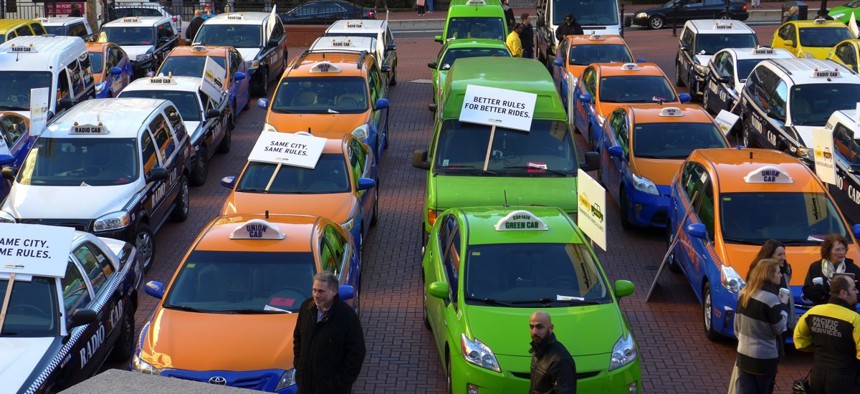Uber’s Portland Lobbying Swarm; 2 More Governors Take Action on Confederate Flag

Around 70 of Portland, Oregon's 460 cabbies protested ride-sharing companies like Uber in January by parking in Pioneer Square. Aaron Parecki / Flickr.com

Connecting state and local government leaders
Also: Boston adjusts regulations for higher sea levels and Spokane’s pervious streets.
A roundup of state and local news from around the nation ...
PORTLAND, Oregon: “Mr. Plouffe, if you come to Portland without following our rules, we’re going to throw the book at you!” said Mayor Charles Hale to David Plouffe, the former Obama campaign strategist turned Uber executive. Hale is quoted in a Bloomberg Business feature on the car-sharing company’s methodical strategy to move into Oregon's largest city. As the piece notes, Hale was constrained in his bluster by the facts: “A city of 600,000 can play tough with a $40 billion company, particularly one that is used to getting its way, for only so long.” [Bloomberg Business]
VIRGINIA and MARYLAND: Virginia Gov. Terry McAuliffe and Maryland Gov. Larry Hogan have joined officeholders across the South in acting to strip symbols of the Confederacy from public spaces and state property in the wake of the racially motivated South Carolina church shootings that killed nine people last week. The two governors announced on Tuesday that they have taken steps to remove images of the Confederate battle flag from their states’ Sons of Confederate Veterans specialty license plates.
The move comes amid national outcry in opposition to continued official use of the Confederate flag and is bolstered by a U.S. Supreme Court ruling issued last week. In a case weighing free-speech rights, the court majority agreed that license plates can be seen as conveying government-sanctioned messages, so officials have proper authority to restrict the messages their governments convey.
Here’s Gov. McAuliffe, according to WAMU News:
“First, this morning I asked the attorney general’s office to take steps to reverse a prior court ruling that requires the Confederate flag be placed on state license plates. Second, I have directed Secretary of Transportation Aubrey Layne to develop a plan for replacing the currently issued plates as quickly as possible. These steps will, I hope, make clear that this Commonwealth does not support the display of the Confederate battle flag or the message it sends to the rest of the world.”
What is now generally accepted as the flag of the Confederacy was in fact the Civil War battle flag of the Army of Northern Virginia. The Commonwealth has issued a total of 1,500 Sons of Confederate Veterans license plates in the decade since they were made available. Seven states in addition to Virginia and Maryland currently provide versions of the plates. [WAMU]
SPOKANE, Washington: “Pervious” is not a dirty word. It’s what you call the kind of streets this Eastern Washington city is experimenting with in order to filter stormwater laced with oil and tar and garbage that runs right off existing impervious streets and into the Spokane River. Starting last year, the city committed to better handle runoff by treating it right where it hits the ground—with new roadside “bio-retention areas,” for example, and with street surfaces that allow water to leak right through them to filtering layers of gravel and soil. Those layers strip out pollutants from the water before sending it on its way. Watch the city’s video on the project.
[Vimeo / City of Spokane]
CLEVELAND, Ohio: A Rustbelt Valley? Where better to find support for your digital-age manufacturing startup than in one of the states of the Union with long experience in manufacturing now looking for contemporary Wright brothers to put them back on the map?
States like Ohio and Michigan and Pennsylvania say they have what “hardware” entrepreneurs really need. They’ve got people with experience making things and rare startup accelerators like Cleveland-based LaunchHouse willing to risk investing in products and technologies that will live in the world beyond the Internet.
Also: They’ve got abundant cheap office and warehouse space! Next City:
Hardware startups are more viable than ever thanks to evolving prototyping technology and, in many places, a renewed emphasis on advanced manufacturing… In cities such as Cleveland, Pittsburgh and Youngstown, Ohio, there is already an infrastructure for affordable manufacturing in place. Plenty of institutional partners like NASA in Cleveland are eager to support new entrepreneurs.
It’s about tapping into and bolstering the “ecosystem” for this kind of economic growth that matters, Next City reports in a story that features a raft of startups, including one called JuggerBot 3D, which makes affordable 3D printers for manufacturers. Founder Jim D’Andrea explains why the Rust Belt works for him. “In Youngstown, everybody in our network has some involvement in manufacturing, so it’s easy for them to help us out.” [Next City]
BOSTON, Massachusetts: A good idea on the eastern seaboard in the climate change era: Planning for rising seas. Mayor Marty Walsh is leading the charge in his famous waterfront city to cut red tape tied to building or retrofitting real estate to protect against flood damage. Mainly, he is directing agencies to ease height restrictions so ground floors can be given over to flood protection and building power sources can be moved to higher climes.
According to The Boston Globe:
In the new Spaulding Rehabilitation Hospital that opened in the Charlestown Navy Yard two years ago… the primary electrical operations are on the roof, the ground floor is intentionally two-and-a-half feet above the 500-year flood plain elevation, and the landscaping is designed to serve as a shield to protect against a major storm surge.
[Boston Globe]
(Photo by Aaron Parecki / Flickr.com)

NEXT STORY: Work Management Is Helping Arkansas Handle More Court Project Requests




